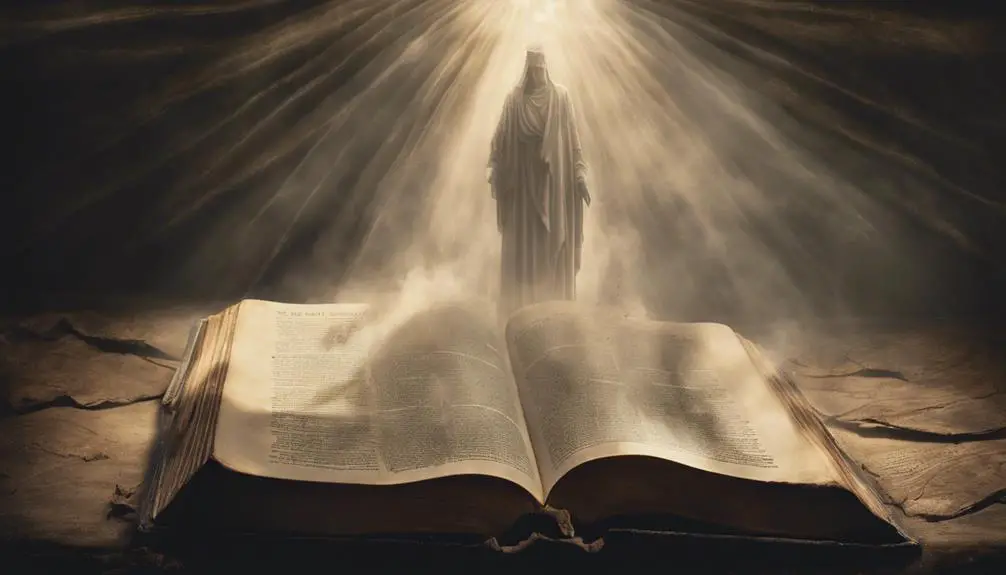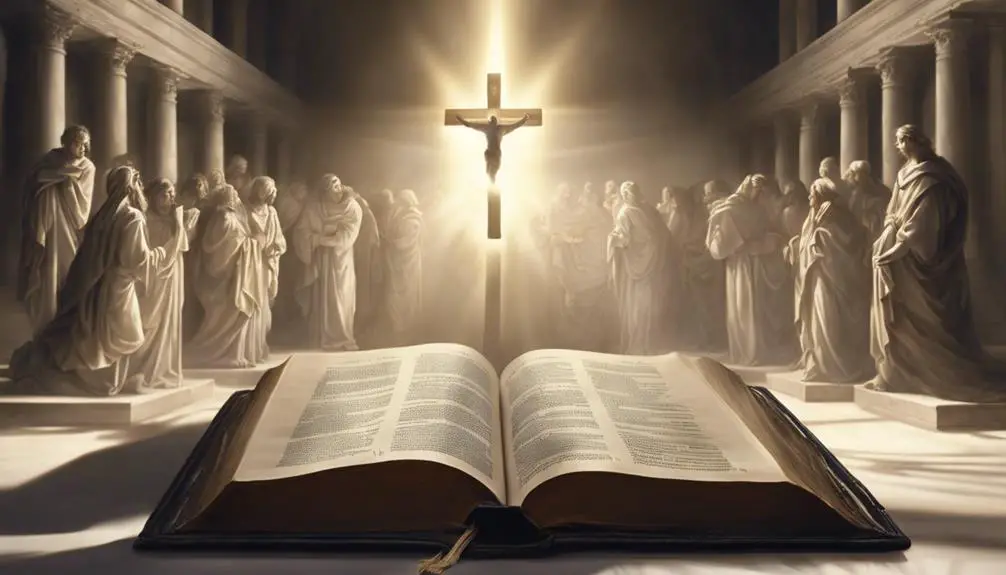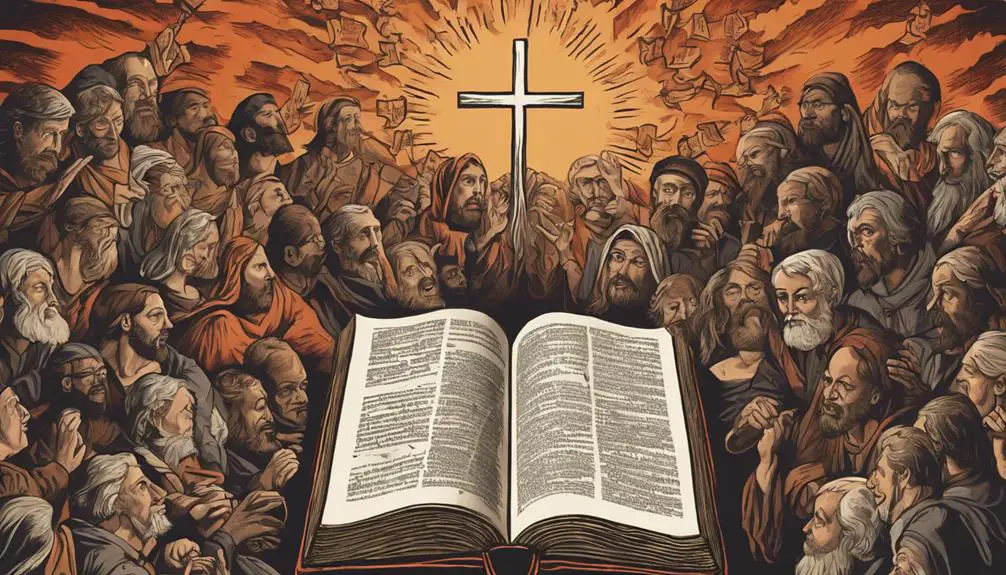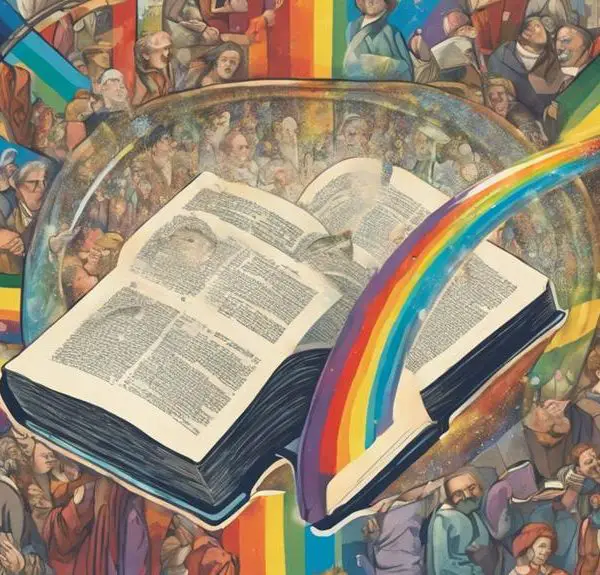Hunt for possible hints towards purgatory in the Bible, while diving into the complex world of biblical interpretations.

Are Ther Any Bible Verses About Purgatory
Peering into the dense fog of Biblical interpretations, you might wonder if there are any explicit references to purgatory in the Bible. While the term 'purgatory' doesn't appear directly, there are passages that some believe hint towards such a place of purification.
Do these verses truly suggest a middle ground between Heaven and Hell, or are we simply trying to read between the lines? The answer to this question might be more complex than you imagine, beckoning you to dig deeper into the intricate world of biblical exegesis.
Key Takeaways
- The Bible doesn't explicitly mention Purgatory, leading to varied interpretations among Christian denominations.
- Verses like Matthew 12:32 and 1 Corinthians 3:11-15 are often cited as potential references to a post-death purification process.
- The apocryphal book, 2 Maccabees 12:39-45, which is recognized by Catholics, aligns with the concept of prayers for the dead's purification.
- The ambiguity of scriptural references to Purgatory contributes to ongoing theological debates and controversies.
Understanding the Concept of Purgatory

To truly comprehend the concept of purgatory, you must delve into its origins, its relevance in various religious doctrines, and the scripture that supports or challenges its existence. Purgatory, derived from the Latin word 'purgatorium', means 'place of cleansing'. In essence, it's seen as a spiritual state or place of purification for souls who've died in a state of grace, but still carry the weight of unforgiven minor sins or unpaid temporal punishments.
The doctrine of purgatory primarily finds its roots in the Catholic Church, but you'll find nuanced interpretations in other Christian denominations as well. For Catholics, purgatory isn't a second chance at salvation, but a merciful act of God's justice, purifying the soul before its ascent to heaven.
However, Protestant branches generally reject the concept, arguing it isn't explicitly mentioned in the Bible. Instead, they believe in 'sola scriptura' (Scripture alone), implying that all necessary truths about faith and life are directly stated in the Bible, which doesn't openly declare purgatory. Therefore, the concept has been a subject of theological debate for centuries. Understanding these perspectives will help you grasp the complexity of purgatory in religious discourse.
Biblical Interpretations of Afterlife

Building on our understanding of purgatory, let's now explore the various biblical interpretations of afterlife, which play a pivotal role in shaping doctrines and beliefs about life beyond death in different Christian denominations.
The concept of afterlife in the Bible isn't monolithic but varies across scriptures. The Old Testament, for instance, often speaks of Sheol, a shadowy, uncertain place of the dead, devoid of God's presence. Conversely, the New Testament introduces the concepts of Heaven and Hell, where righteous souls enjoy eternal life, and sinners face eternal damnation.
Within Christianity, there's a spectrum of interpretations. Some branches, like Protestantism, largely interpret afterlife as a binary of Heaven and Hell. The Eastern Orthodox Church, however, believes in a state of 'theosis', where the soul is gradually transformed into divine likeness.
Catholicism uniquely introduces Purgatory, a state of purification for souls destined for Heaven but who still need to atone for their sins. However, we'll dive deeper into potential purgatory references in scriptures later.
Potential Purgatory References in Scriptures

Often, you'll find that the Bible doesn't explicitly mention Purgatory, but several passages could be interpreted as indirect references to this intermediate state of purification. For instance, Matthew 12:32 suggests a distinction between sins that can and can't be forgiven after death, hinting at a possible purgative process.
Additionally, you might consider 1 Corinthians 3:11-15, where Paul talks about a purifying fire that tests the quality of one's works. If the works endure, the person receives a reward. If the works are burned up, the person suffers loss, yet is still saved, but only through fire. Here, the notion of purification through fire aligns with traditional depictions of Purgatory.
The passage in 2 Maccabees 12:39-45 also lends credence to this concept. It advocates prayers for the dead so that they may be freed from sins, a practice closely aligned with the Catholic belief in Purgatory's purifying function.
Ultimately, while the Bible doesn't explicitly name Purgatory, the interpretation of these passages often lends itself to the idea of an intermediate state of cleansing. However, these interpretations aren't without controversy, as interpretations vary widely across different Christian denominations.
Controversies Surrounding Purgatory

While numerous Bible verses may hint at the concept of Purgatory, it's a subject steeped in controversy and differing interpretations across various Christian denominations. You must understand that for some, Purgatory represents a critical doctrine, while for others, it's viewed as a theological error.
One of the central controversies revolves around the perceived ambiguity of biblical texts. The verses often cited as evidence for Purgatory, like those in 2 Maccabees or 1 Corinthians, are open to multiple interpretations. Critics argue that these verses are being misconstrued and don't explicitly endorse a place of purgation after death.
Another bone of contention is the inherent nature of Purgatory. Does it contradict the doctrine of salvation by grace alone? Some critics believe that the concept of purification through suffering undermines Christ's complete atonement on the cross, suggesting that human effort is necessary for salvation.
The historical development of the doctrine of Purgatory also sparks debate. Critics point to its late emergence, suggesting its human, rather than divine, origin. They argue that it was born more out of medieval Church practices and theology, rather than biblical exegesis. These controversies illustrate the complex and disputed nature of Purgatory within Christianity.
Theological Views on Purgatory

In the realm of theology, views on Purgatory can differ significantly, reflecting a broad spectrum of interpretations and beliefs within various Christian denominations. While the Roman Catholic Church maintains a strong belief in Purgatory, viewing it as a purifying state that prepares souls for Heaven, Protestant denominations often reject this concept, arguing that it isn't explicitly mentioned in the Bible.
Your understanding of Purgatory, therefore, can be deeply influenced by your theological orientation. For instance, Eastern Orthodox Christians embrace a concept similar to Purgatory, but they don't use the term 'Purgatory' and their understanding of the afterlife differs in key aspects from the Catholic view.
Some theologians suggest that Purgatory may not be a place but a process of purification. This view sees Purgatory as the soul's journey towards perfection, a journey that continues after physical death. This perspective, while not universally accepted, offers a nuanced interpretation of the concept of Purgatory.
In essence, the theological views on Purgatory are as diverse as Christianity itself. The concept, steeped in centuries of debate and interpretation, continues to generate discussion and remains a significant aspect of Christian theological discourse.
Conclusion
In conclusion, you'll find that the concept of purgatory and its biblical basis can be contentious. Some scriptures may hint at a purgatorial state, but clear, explicit references are lacking. This ambiguity fuels ongoing theological debates.
Ultimately, your interpretation depends on your religious or philosophical beliefs. Remember, in-depth study and personal reflection are key to understanding such complex spiritual matters.



Sign up